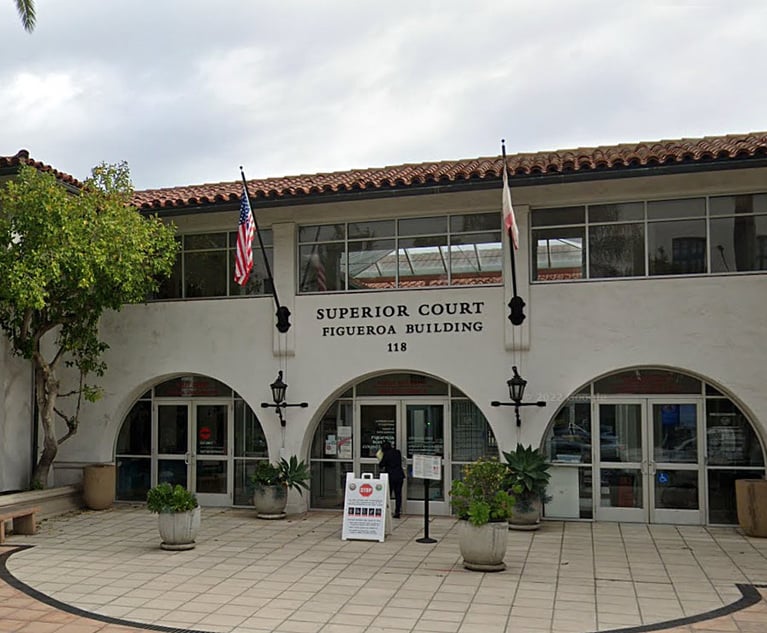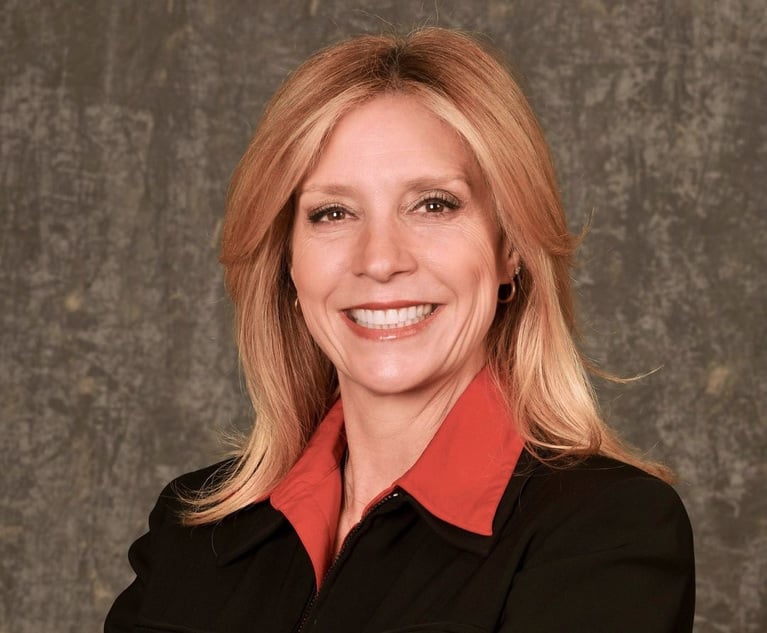 Xavier Becerra, attorney general of California, testifies before the U.S. Senate Committee on Commerce, Science, and Transportation on Sept. 19, 2017. (Photo: Diego M. Radzinschi/ALM)
Xavier Becerra, attorney general of California, testifies before the U.S. Senate Committee on Commerce, Science, and Transportation on Sept. 19, 2017. (Photo: Diego M. Radzinschi/ALM)Calif. Attorney General On the Hunt for Consumer Privacy Act Enforcers
California Attorney General Xavier Becerra has started the hiring process for three lawyers who will help "implement and enforce" the California Consumer Privacy Act.
August 12, 2019 at 05:48 PM
3 minute read
Help wanted: Attorneys with an interest in California’s cutting-edge privacy law, one that’s shaping the national dialogue on digital data regulations. Must be able to defend the inevitable lawsuits, provide free counsel to affected businesses and adjust to still-developing regulations and legislative changes in the space. Pay: Not exactly comparable to Big Law.
California Attorney General Xavier Becerra has started the hiring process for lawyers who will help “implement and enforce” the California Consumer Privacy Act. The law, which gives consumers the right to opt out of the sale of their personal information, goes into effect in January.
Job postings on the attorney general’s website seek midlevel deputy attorneys general to work in the consumer law section in the Los Angeles, San Diego and San Francisco offices. “The initial assignment for these positions will include the enforcement of privacy laws,” the description reads. Becerra’s press office confirmed the new hires will work on the Consumer Privacy Act.
The attorney positions—the Department of Justice’s website listed three as of Monday—appear to be the first of eight created in the governor’s 2019-2020 budget to help handle what Becerra has predicted will be an enormous workload generated by the new law.
The Privacy Act gives the attorney general the sole authority to enforce most of its provisions, which apply to businesses with gross revenues of $25 million or more or those that buy, sell or share the data of 50,000 or more consumers. The International Association of Privacy Professionals calculated that the regulations will apply to more than 500,000 U.S. companies.
The law also allows businesses and third parties to ask the attorney general for guidance on complying with its provisions.
Becerra and his representatives have complained that even with the boosted staffing and an additional $4.7 million budgeted for the law’s enforcement, the department is unlikely to have the resources to take many wide-ranging actions against suspected violators.
At a state Senate committee hearing in April, Stacey Schesser, supervising deputy attorney general for the consumer law section’s privacy unit, said her office, even if expanded, may only have the capacity to handle three major cases a year.
“There’s 40 million Californians and the scope of businesses that the CCPA applies to is significantly large,” Schesser said.
Becerra backed ultimately unsuccessful legislation this spring that would have created a private right of action for consumers to pursue violations. The bill also would have dropped the requirement that the attorney general offer compliance opinions to businesses and instead allow him to simply provide advisory materials.
The Attorney General’s Office is currently drafting regulations, expected later this year, spelling out how the law will operate. Becerra has said enforcement will begin in June 2020.
The privacy-attorney positions advertised on the Department of Justice’s website would be classified as deputy attorneys general III. The salary for that job title ranges between $110,520 and $141,780.
This content has been archived. It is available through our partners, LexisNexis® and Bloomberg Law.
To view this content, please continue to their sites.
Not a Lexis Subscriber?
Subscribe Now
Not a Bloomberg Law Subscriber?
Subscribe Now
NOT FOR REPRINT
© 2025 ALM Global, LLC, All Rights Reserved. Request academic re-use from www.copyright.com. All other uses, submit a request to [email protected]. For more information visit Asset & Logo Licensing.
You Might Like
View All


Santa Barbara Judge Accused of Moonlighting as Attorney for Secretary/Girlfriend
4 minute readTrending Stories
- 1'True Leadership Is About Putting Others First': 2024 In-House Award Winners Inspired, Took Road Less Traveled
- 2A Q&A with Sidley Austin's London Leader
- 3New York-Based Harris Beach Combines With Connecticut-Based Murtha Cullina, Forming NE Powerhouse
- 4New Year, New Am Law 100: Challenges Await These Newly Merged Law Firms
- 5Thursday Newspaper
Who Got The Work
Michael G. Bongiorno, Andrew Scott Dulberg and Elizabeth E. Driscoll from Wilmer Cutler Pickering Hale and Dorr have stepped in to represent Symbotic Inc., an A.I.-enabled technology platform that focuses on increasing supply chain efficiency, and other defendants in a pending shareholder derivative lawsuit. The case, filed Oct. 2 in Massachusetts District Court by the Brown Law Firm on behalf of Stephen Austen, accuses certain officers and directors of misleading investors in regard to Symbotic's potential for margin growth by failing to disclose that the company was not equipped to timely deploy its systems or manage expenses through project delays. The case, assigned to U.S. District Judge Nathaniel M. Gorton, is 1:24-cv-12522, Austen v. Cohen et al.
Who Got The Work
Edmund Polubinski and Marie Killmond of Davis Polk & Wardwell have entered appearances for data platform software development company MongoDB and other defendants in a pending shareholder derivative lawsuit. The action, filed Oct. 7 in New York Southern District Court by the Brown Law Firm, accuses the company's directors and/or officers of falsely expressing confidence in the company’s restructuring of its sales incentive plan and downplaying the severity of decreases in its upfront commitments. The case is 1:24-cv-07594, Roy v. Ittycheria et al.
Who Got The Work
Amy O. Bruchs and Kurt F. Ellison of Michael Best & Friedrich have entered appearances for Epic Systems Corp. in a pending employment discrimination lawsuit. The suit was filed Sept. 7 in Wisconsin Western District Court by Levine Eisberner LLC and Siri & Glimstad on behalf of a project manager who claims that he was wrongfully terminated after applying for a religious exemption to the defendant's COVID-19 vaccine mandate. The case, assigned to U.S. Magistrate Judge Anita Marie Boor, is 3:24-cv-00630, Secker, Nathan v. Epic Systems Corporation.
Who Got The Work
David X. Sullivan, Thomas J. Finn and Gregory A. Hall from McCarter & English have entered appearances for Sunrun Installation Services in a pending civil rights lawsuit. The complaint was filed Sept. 4 in Connecticut District Court by attorney Robert M. Berke on behalf of former employee George Edward Steins, who was arrested and charged with employing an unregistered home improvement salesperson. The complaint alleges that had Sunrun informed the Connecticut Department of Consumer Protection that the plaintiff's employment had ended in 2017 and that he no longer held Sunrun's home improvement contractor license, he would not have been hit with charges, which were dismissed in May 2024. The case, assigned to U.S. District Judge Jeffrey A. Meyer, is 3:24-cv-01423, Steins v. Sunrun, Inc. et al.
Who Got The Work
Greenberg Traurig shareholder Joshua L. Raskin has entered an appearance for boohoo.com UK Ltd. in a pending patent infringement lawsuit. The suit, filed Sept. 3 in Texas Eastern District Court by Rozier Hardt McDonough on behalf of Alto Dynamics, asserts five patents related to an online shopping platform. The case, assigned to U.S. District Judge Rodney Gilstrap, is 2:24-cv-00719, Alto Dynamics, LLC v. boohoo.com UK Limited.
Featured Firms
Law Offices of Gary Martin Hays & Associates, P.C.
(470) 294-1674
Law Offices of Mark E. Salomone
(857) 444-6468
Smith & Hassler
(713) 739-1250







